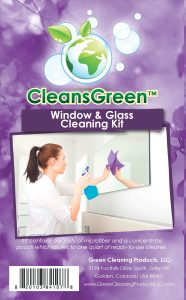Why ARE window cleaners SO harmful to you and your family?
Clear … and without streaking. That is the goal when we clean our windows or mirrors. Window cleaners are designed to accomplish this task easily and quickly. Without the proper cleaner, however, more time is spent chasing the streaks or the dirty smudgy spots than we do with our initial clean of the window or mirror. For this reason we continually seek an effective, streak free window cleaner.
Our pursuit of clean windows is so strong that on a single day in 1997, in a single state (California), over 102 TONS (that is equivalent to over 800,000 QUARTS) of glass cleaner was sold. In short, A LOT of window cleaner is consumed.
Is Window Cleaner Toxic?
Unfortunately the ingredients make window cleaner harmful to you and your family!
Cleaning ingredients vary in the type of health hazard they pose. Some cause acute, or immediate, hazards such as skin or respiratory irritation, watery eyes, or chemical burns, while others are associated with chronic, or long-term, effects such as cancer. Since chemicals in cleaning products are not required to be listed on the packages, we do not know which harmful active ingredient in window cleaner is used in a particular window cleaner product we purchase.
To make them work, window cleaners that are not green cleaning products may contain one or more of the following harmful ingredients:
- Ammonia
- Butyl Cellosolve / Glycol Ether
- Phthalates
Some of the reasons (and consequences) for using these window cleaner harmful ingredients are:
Why is Ammonia used in window cleaner? Ammonia is a mild disinfectant used to kill some germs. It also works well on a variety of surfaces as a glass cleaner or degreaser. It is a favorite agent to ensure a streak free clear result. Unfortunately it is not just horrible smelling, ammonia is a strong irritant to skin, eyes, throat and lungs, damaging the mucus membrane and airways. If accidentally mixed with bleach, you end up with a poisonous chloramine gas. Asthma sufferers may be more sensitive to breathing ammonia than others. This strong irritant can also cause kidney and liver damage.
Butyl cellosolve, a glycol ether (also known as 2-butoxyethanol, 2-butoxyethanol acetate or Ethylene glycol monobutyl ether), is a solvent commonly found in glass cleaner and all-purpose cleaners. Many glycol ethers have almost no smell and you can be overexposed to them without knowing it (the skin can absorb the vapors from the air). Glycol ethers have been linked to reduced fertility (both in men and women), anemia, chronic fatigue syndrome, autism, liver and kidney damage, and more. According to Women’s Voices for the Earth, this window cleaner harmful ingredient is found in Windex Aerosol.
Phthalates are carriers for fragrance in glass cleaners, deodorizers, laundry detergents and fabric softeners. These have been linked to adverse effects on male children, reduced sperm count in adult men, and increased allergic symptoms and asthma in children.
Windex is as synonymous in our language for window cleaner as Kleenex is for tissue. Windex frequently touts the fact that it is “Windex with Ammonia” directly on the label. As summarized in Green, but Toxic, Are Your Green Cleaning Products Toxic or Safe, you may feel comfortable in knowing the ingredients for the ecofriendly version of Windex with Vinegar are safe, only to learn the active ingredient in that product is ethylene glycol, another term for butyl cellosolve.
Is glass cleaner toxic? I think we can see that the harmful chemicals in window cleaner are reasons to seek green cleaning products and green janitorial supplies that are safe and non-toxic such as those offered by Green Cleaning Products.

 Shop for Green Cleaning Products
Shop for Green Cleaning Products
Looking for the best green home cleaning products? We are pleased to offer green cleaning products for sale on Amazon from a number of hand selected companies that we feel offer the best products for our Green Cleaning customers!
For the first time we are now living in an area which relies on a septic system and it is therefor important that any household cleaning products used, and which could enter the system, is safe to use and will not destroy the bacteria of the system itself.
Could you please confirm for me if any of your products could cause a problem in this area.